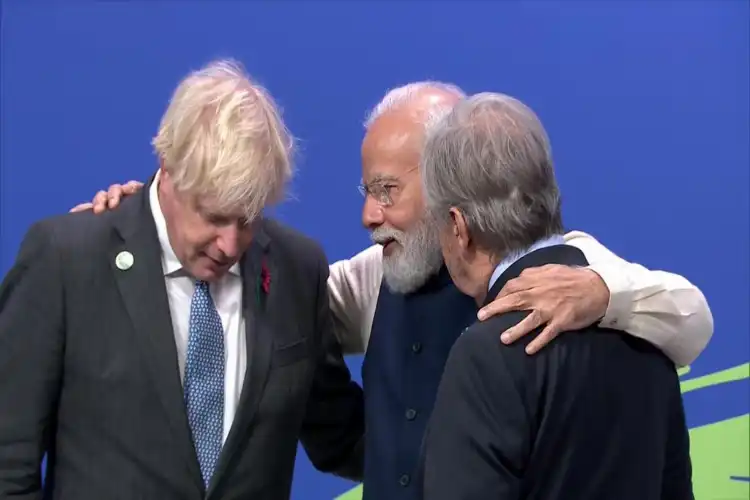
 Sushma Ramachandran
Sushma Ramachandran
The Glasgow climate summit has ended with a renewed commitment to contain the rise of global temperature to 1.5 degrees Celsius above pre-industrial levels. This commitment was made in the final statement which was in itself an achievement given that many countries felt that the main goal of the Paris Agreement in 2015 was to hold temperature rises well below 2 degrees Celsius. But little specific action has been outlined to achieve this goal since the only new country to commit a net-zero emissions target was India. The conclusion of the meeting was also marred by a controversy over the terminology relating to coal which was mentioned almost tearfully by the COP26 President Alok Sharma at the concluding session.
It was interesting that he had little to say on the failure of developed countries to fulfill promises made to provide climate finance to poor countries as well as funds for “loss and damage” suffered by them due to this crisis. This is indicative of the North-centric approach of the conference which developing countries feel has not addressed their key issues.
The attitude emerged clearly in the flutter over the change in wording from ‘phase out’ to ‘phase down’ of coal use, with India being blamed for watering down the text. In actuality, the phrase was taken from the U.S.-China climate cooperation statement issued a day before the summit concluded where the term phase-down was used by the latter country in relating to coal use.
Climate activists are now pointing to the strange fact that neither coal nor other fossil fuels like oil and gas have been mentioned in any previous declarations. According to one expert interviewed by the BBC, it is akin to talking about the pandemic without referring to the name of the virus. The word change related to coal was part of a text seeking phase-out of both coal and subsidies on fossil fuels. The issue of subsidies is critical for this country as it provides support for vulnerable sections to utilize cooking gas through various special schemes.
Equally, it is difficult for India as well as other developing countries to phase out coal in a hurry given its crucial role as an energy source.
On the other hand, there has been no mention of phasing out of fossil fuels like oil and natural gas simply because developed countries are not prepared to move away from these in the foreseeable future. These countries used coal to the maximum extent required to develop their industrialized economies and only then shifted to oil and natural gas. In the case of some major emitters like the U.S., it became possible to access natural gas from the reserves found within their borders. Hence, it was easy to move to a relatively cheap source of energy. Such easy access is not available to most poorer countries. India, for instance, has to import oil at a cost of over 100 billion dollars annually to meet its energy needs.
It needs to be explained to the layman that the climate conferences have been held since 1992.
The term COP stands for Conference of the Parties. These parties refer to the 197 countries that agreed to a new environmental pact, the United Nations Framework Convention on Climate Change in 1992. The Glasgow conference was the 26th meeting being held under the convention, hence it became COP26.
This summit has become noteworthy, apart from controversies, for the role India has played in announcing goals for reaching net-zero emissions for the first time. It also made five promises at the summit which were outlined by Prime Minister Narendra Modi in his address. Along with the target of 2070 for net-zero, it committed to reducing carbon intensity by 45 percent and cutting projected carbon emission by one billion tonnes by 2030. On renewable energy, the commitments were to bring this component in the country’s overall energy mix to 50 percent and to aim for 50 GW of non-fossil energy capacity by 2030.
In contrast, there was little forthcoming from rich countries about emission targets, climate finance, or the critical issue of compensation for loss and damage due to the climate crisis. On climate finance, a commitment had been made in 2009 to provide 100 billion dollars annually to the South to support countries that are vulnerable and at the frontlines of the climate crisis. This was meant to give some benefit to poor countries facing adaptation measures that affect their economic productivity and human development. The verbal commitment to funding, however, has remained just that and there has been little progress on actually making good on this promise. The Glasgow summit disappointingly ended with the promise of a “dialogue” on this issue rather than concrete moves towards fulfilling the goals of climate finance.
The entire summit must also be viewed in the context of the countries that have the biggest responsibility for carbon emissions. Though India is frequently cited as being one of the biggest emitters, it is only sixth in terms of total emissions. On a per-capita basis, however, the scenario shows India is vastly lower down the list. The top three countries in terms of emissions on a per capita basis are Australia, the U.S., and Canada. Their emissions range from around 16 to 17 tonnes on a per capita basis compared to 1.8 tonnes for India and the global average of 4.8 tonnes. Some European countries, however, have kept their emission levels much lower, showing that policy measures make a difference in this regard. For instance, the U.K. has per capita emissions of 5.8 tonnes and France of 4.16 tonnes
In this backdrop, one must recognise that COP26 has been weighted more in favour of developed countries as the finance needed to support countries facing the brunt of the climate crisis has not been forthcoming While some more commitments were made to increase adaptation finance for the poorest and most vulnerable countries, it has to be seen when these will ultimately become available to those who need it most. Perhaps the most significant commitment was the specific one to stay below 1.5 degrees of warming. COP26 can thus be considered a limited success. But going ahead much will depend on the actual measures to achieve this goal, largely by the world’s biggest emitters.
